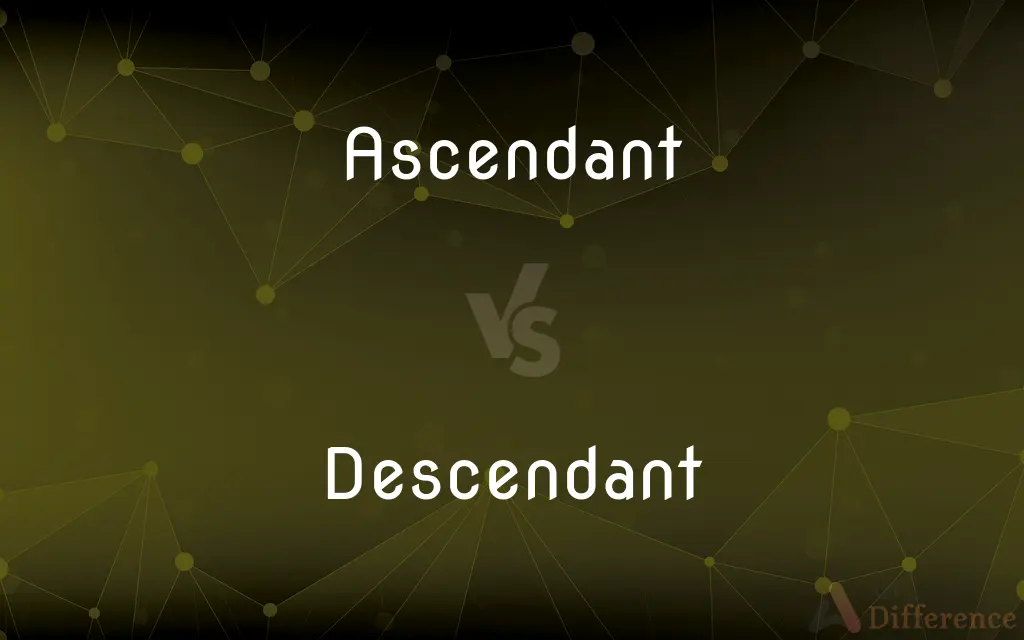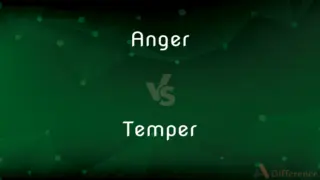Ascendant vs. Descendant — What's the Difference?
By Tayyaba Rehman — Updated on October 25, 2023
"Ascendant" relates to rising, ascending, or dominant position, while "Descendant" refers to someone/something descending, especially an offspring or heir.

Difference Between Ascendant and Descendant
Table of Contents
ADVERTISEMENT
Key Differences
Ascendant and Descendant are two words that sit on opposite ends of a spectrum when discussing direction or lineage. "Ascendant" often refers to the act of rising, whether it's in terms of physical movement, status, or influence. On the other hand, "Descendant" points to something or someone that is coming down or derives from a particular origin.
In astrology, the Ascendant is the zodiacal sign and degree that were ascending on the eastern horizon at a specific time and location, often at one's birth. It plays a pivotal role in defining one's personality in astrological terms. Conversely, the Descendant, in this context, refers to the sign directly opposite the Ascendant, influencing one's relationships and interactions with others.
From a genealogical perspective, while Ascendant might refer to one's ancestors or forebears, Descendant specifically denotes those who come after – one's offspring or the generations that follow. The latter is especially used when discussing rights, inheritance, or lineage.
In a more general sense, when Ascendant is used to describe a trend, it implies that it's on the rise or gaining traction. Meanwhile, Descendant could be used to illustrate something on the decline or losing prominence.
In essence, while both Ascendant and Descendant connect to direction and lineage, the former largely focuses on upward movement or origin, and the latter emphasizes downward movement or the continuation of a lineage.
ADVERTISEMENT
Comparison Chart
Basic Meaning
Relating to rising or ascending.
Relating to descending or someone who comes after.
In Astrology
Sign rising on the eastern horizon at birth.
Sign opposite the Ascendant, affecting relationships.
In Genealogy
Might refer to ancestors.
Refers to offspring or those who come after.
In Trends
Describes something on the rise or gaining prominence.
Describes something on the decline or losing traction.
Antonym
Descendant.
Ascendant.
Compare with Definitions
Ascendant
Rising in power or influence.
The ascendant tech company dominated the market.
Descendant
A person who is descended from a particular ancestor.
She is a descendant of the town's founder.
Ascendant
The point of the ecliptic or degree of the zodiac rising above the eastern horizon at the time of a birth or event.
Her astrological chart showed Leo as her ascendant.
Descendant
The point of the ecliptic or sign of the zodiac setting in the west at the time of a birth or event.
His descendant sign plays a role in his romantic relationships.
Ascendant
Moving upward; ascending.
The ascendant plane took off smoothly.
Descendant
An heir or successor.
As the eldest, he was the main descendant to the estate.
Ascendant
An ancestor or forebear.
He claimed to be an ascendant of royalty.
Descendant
One whose descent can be traced to a particular individual or group
A descendant of Queen Victoria.
Descendants of a prize-winning horse.
Ascendant
The ascendant (, Asc or As) is the astrological sign (and degree of that sign) that is ascending on the eastern horizon at the specific time and location of an event. According to certain astrological theories, celestial phenomena reflect or influence human activity on the principle of 'as above, so below'.
Descendant
Something derived from a prototype or earlier form
Today's bicycles are descendants of the earlier velocipede.
Ascendant
Inclining or moving upward; ascending or rising.
Descendant
In astrology, the point of the ecliptic or the sign of the zodiac that sets in the west at the time of a person's birth or other event.
Ascendant
Dominant in position or influence; superior.
Descendant
Variant of descendent.
Ascendant
The position or state of being dominant or in control
A conservative policy currently in the ascendant.
Descendant
Descending; going down
The elevator resumed its descendant trajectory.
Ascendant
In astrology, the point of the ecliptic or the sign of the zodiac that rises in the east at the time of a person's birth or other event.
Descendant
Descending from a biological ancestor.
Power in the kingdom is transferred in a descendant manner.
Ascendant
An ancestor.
Descendant
Proceeding from a figurative ancestor or source.
Ascendant
Rising, moving upward.
Descendant
One of the progeny of a specified person, at any distance of time or through any number of generations.
The patriarch survived many descendants: five children, a dozen grandchildren, even a great grandchild.
Ascendant
Surpassing or controlling.
Descendant
(figuratively) A thing that derives directly from a given precursor or source.
This famous medieval manuscript has many descendants.
Ascendant
Being in control; superiority, or commanding influence; ascendancy.
One man has the ascendant over another.
Descendant
(biology) A later evolutionary type.
Dogs evolved as descendants of early wolves.
Ascendant
An ancestor.
Descendant
(linguistics) A language that is descended from another.
English and Scots are the descendants of Old English.
Ascendant
(usually followed by to) A royal heir assuming (a place of power).
Given his father’s ghastly demise, one would not expect such glee from the ascendant to his throne.
Descendant
(linguistics) A word or form in one language that is descended from a counterpart in an ancestor language.
Ascendant
Ascent; height; elevation.
Descendant
Descendent.
Ascendant
(astrology) The horoscope, or that degree of the ecliptic which rises above the horizon at the moment of one's birth; supposed to have a commanding influence on a person's life and fortune.
Descendant
One who descends, as offspring, however remotely; - correlative to ancestor or ascendant.
Our first parents and their descendants.
The descendant of so many kings and emperors.
Ascendant
Ascent; height; elevation.
Sciences that were then in their highest ascendant.
Descendant
A person considered as descended from some ancestor or race
Ascendant
The horoscope, or that degree of the ecliptic which rises above the horizon at the moment of one's birth; supposed to have a commanding influence on a person's life and fortune.
Descendant
Going or coming down
Ascendant
Superiority, or commanding influence; ascendency; as, one man has the ascendant over another.
Chievres had acquired over the mind of the young monarch the ascendant not only of a tutor, but of a parent.
Descendant
Moving downward; descending.
The descendant path was steep and rocky.
Ascendant
An ancestor, or one who precedes in genealogy or degrees of kindred; a relative in the ascending line; a progenitor; - opposed to descendant.
Descendant
An offshoot, like a branch.
The new software is a descendant of the original version.
Ascendant
Rising toward the zenith; above the horizon.
The constellation . . . about that time ascendant.
Ascendant
Rising; ascending.
Ascendant
Superior; surpassing; ruling.
An ascendant spirit over him.
The ascendant community obtained a surplus of wealth.
Without some power of persuading or confuting, of defending himself against accusations, . . . no man could possibly hold an ascendent position.
Ascendant
Position or state of being dominant or in control;
That idea was in the ascendant
Ascendant
Someone from whom you are descended (but usually more remote than a grandparent)
Ascendant
Tending or directed upward;
Rooted and ascendant strength like that of foliage
Ascendant
Most powerful or important or influential;
The economically ascendant class
D-day is considered the dominating event of the war in Europe
Ascendant
Superior or predominant.
The team's ascendant performance won them the championship.
Common Curiosities
How are "ascendant" and "descendant" used in astrology?
"Ascendant" is the zodiacal sign rising at birth, affecting personality, while "descendant" affects relationships.
Can "ascendant" describe a rising trend?
Yes, "ascendant" can describe something on the rise or gaining prominence.
Can "ascendant" refer to ancestors?
Yes, "ascendant" can refer to one's ancestors or forebears.
Is "descendant" always about family lineage?
While often used in that context, "descendant" can also refer to something derived or descended from another thing.
How does the "descendant" sign influence an individual?
In astrology, the "descendant" sign can influence one's relationships and interactions with others.
Is "ascendant" always about upward movement?
Mostly, but in some contexts, it refers to ancestry or dominance.
Can "descendant" refer to products or versions?
Yes, a product derived from another can be called its "descendant."
Can one be the "descendant" of an idea?
Yes, metaphorically, a thought or concept derived from another can be its "descendant."
Is "descendant" the opposite of "ascendant"?
In many contexts, "descendant" is the antonym of "ascendant."
Can "ascendant" describe someone's mood?
Not typically. It's more about rising or dominance than emotions.
Can "descendant" describe a downward trend?
Yes, "descendant" can describe something on the decline.
Can a company be "ascendant"?
Yes, if it's rising in power or influence.
Do "ascendant" and "descendant" only apply to people?
No, they can apply to ideas, trends, objects, and more, depending on the context.
How are the terms "ascendant" and "descendant" related to inheritance?
"Ascendant" can relate to one's origins, while "descendant" often relates to heirs or those inheriting.
Are "ascendant" and "descendant" opposites in every context?
In many contexts they are, like rising vs. descending, but nuances exist depending on usage.
Share Your Discovery

Previous Comparison
Anger vs. Temper
Next Comparison
Magazine vs. BookletAuthor Spotlight
Written by
Tayyaba RehmanTayyaba Rehman is a distinguished writer, currently serving as a primary contributor to askdifference.com. As a researcher in semantics and etymology, Tayyaba's passion for the complexity of languages and their distinctions has found a perfect home on the platform. Tayyaba delves into the intricacies of language, distinguishing between commonly confused words and phrases, thereby providing clarity for readers worldwide.













































